December 4, 2014 •
House Ethics Committee Issues Holiday Gift Guidance
Today, the U.S. House of Representatives Committee on Ethics released a reminder for its members and staff about the propriety of accepting holiday gifts. Holiday Guidance on the Gift Rule, an eight-page memorandum on House Rule 25, points out some […]
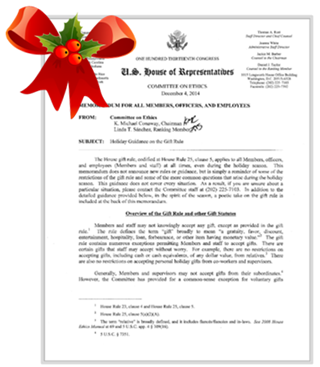 Today, the U.S. House of Representatives Committee on Ethics released a reminder for its members and staff about the propriety of accepting holiday gifts.
Today, the U.S. House of Representatives Committee on Ethics released a reminder for its members and staff about the propriety of accepting holiday gifts.
Holiday Guidance on the Gift Rule, an eight-page memorandum on House Rule 25, points out some of the restrictions, including reminders on how to handle certain types of situations such as attending a holiday reception at a lobbying firm.
In such a situation, attendance is allowed as long as “the food and refreshments are of ‘nominal value’ and offered ‘other than as part of a meal.’”
Should a representative or staff member be offered a gift card or certificate, the memorandum reminds them these items are considered the same as cash; therefore, they cannot be accepted under any gift exception. The communication also reminds members and staff how they must handle unacceptable gifts, how to seek written committee approval in some circumstances, and which financial disclosure requirements may be necessary.
In a seasonal flair, the memorandum ends with a whimsical poem entitled The House Gift Rule: A Rhyme for the Holidays. The poem includes stanzas such as the following:
Gifts worth less than 50 dollars really aren’t scary,
Unless there’s a lobbyist, you can make merry.
But beware! This exception requires you to know
That the donor’s permitted before pulling that bow.
Receptions are gifts but are permitted if they,
Aren’t a meal, regardless if served from a tray.
The exception requires that food value be nominal,
So no caviar, no matter, whether phenomenal.
November 18, 2014 •
Virginia Ethics Panel Readies Recommendations for Governor
The ethics panel recently assembled by Gov. Terry McAuliffe has assembled its recommendations for reforming laws covering gifts and conflicts of interest. The panel recommended a $250 gift limit to public officials as well as creating a new ethics review […]
 The ethics panel recently assembled by Gov. Terry McAuliffe has assembled its recommendations for reforming laws covering gifts and conflicts of interest. The panel recommended a $250 gift limit to public officials as well as creating a new ethics review commission with the power to investigate complaints and hand out penalties for violations.
The ethics panel recently assembled by Gov. Terry McAuliffe has assembled its recommendations for reforming laws covering gifts and conflicts of interest. The panel recommended a $250 gift limit to public officials as well as creating a new ethics review commission with the power to investigate complaints and hand out penalties for violations.
Other recommendations include requiring electronic filing of disclosure forms and prohibiting board and commission members from voting on matters affecting their interests.
The panel will formally submit its recommendations to the governor on December 1.
November 18, 2014 •
Arkansas Lawmakers Prefile Ethics Bill to Clarify Recent Changes
Lawmakers have prefiled a bill to clarify new ethics laws contained in a constitutional amendment passed by voters on November 4, 2014. The amendment prohibits lobbyist gifts and corporate contributions, but the Ethics Commission needs further legislative authority to enforce […]
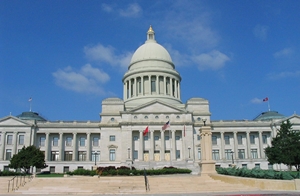 Lawmakers have prefiled a bill to clarify new ethics laws contained in a constitutional amendment passed by voters on November 4, 2014.
Lawmakers have prefiled a bill to clarify new ethics laws contained in a constitutional amendment passed by voters on November 4, 2014.
The amendment prohibits lobbyist gifts and corporate contributions, but the Ethics Commission needs further legislative authority to enforce the constitutional changes.
Democratic Rep. Warwick Sabin and Republican Sen. Jon Woods filed House Bill 1002 as a shell bill, without any specific proposals, to publicize the issue ahead of the session start date on January 12, 2015.
Photo of the Arkansas State Capitol by jglazer75 on Wikimedia Commons.
November 17, 2014 •
Pennsylvania Governor-Elect Wolf Bans Gifts to Transition Team
Gov.-elect Tom Wolf, fresh off of a victorious first campaign for public office, is already taking steps to ensure the ethical conduct of his administration. Wolf is requiring members of his transition team to sign a code of conduct including […]
 Gov.-elect Tom Wolf, fresh off of a victorious first campaign for public office, is already taking steps to ensure the ethical conduct of his administration.
Gov.-elect Tom Wolf, fresh off of a victorious first campaign for public office, is already taking steps to ensure the ethical conduct of his administration.
Wolf is requiring members of his transition team to sign a code of conduct including a ban on accepting gifts, one he plans to extend to the entire executive branch upon taking office.
The pledge also includes a requirement to disclose current and future conflicts of interest and a promise to not use their position for personal gain.
Photo of Gov.-elect Tom Wolf by Bruestle2 on Wikimedia Commons.
October 13, 2014 •
Arkansas Ethics Ballot Measure Offers Tradeoff
A proposed constitutional amendment on the November 4, 2014, ballot will determine whether voters are willing to extend term limits for state lawmakers in exchange for strict ethics laws for lobbyists and corporations. Issue 3 will ban corporate and union […]
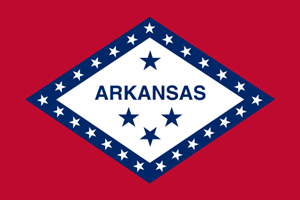 A proposed constitutional amendment on the November 4, 2014, ballot will determine whether voters are willing to extend term limits for state lawmakers in exchange for strict ethics laws for lobbyists and corporations. Issue 3 will ban corporate and union gifts to political campaigns, ban lobbyist gifts to legislative and executive officials, and extend term limits for legislators to at least 16 years.
A proposed constitutional amendment on the November 4, 2014, ballot will determine whether voters are willing to extend term limits for state lawmakers in exchange for strict ethics laws for lobbyists and corporations. Issue 3 will ban corporate and union gifts to political campaigns, ban lobbyist gifts to legislative and executive officials, and extend term limits for legislators to at least 16 years.
Under the current state constitution, lawmakers typically serve no more than six years in the House and eight years in the Senate. The ballot measure would allow lawmakers to serve 16 years in the same office, or even longer for senators winning special two-year terms after each decennial census and redistricting process.
Adding term limits to the bill helped the ethics package pass the Legislature, but has decreased the popularity of the ballot measure in pre-election polls.
April 23, 2014 •
Ohio Lawmakers to Introduce Ethics Reform Legislation
Ohio lawmakers plan to introduce legislation next month making significant changes to state ethics rules for the first time in decades. The bill would double the amount lobbyists can spend on gifts to lawmakers but require lobbyists and public officials […]
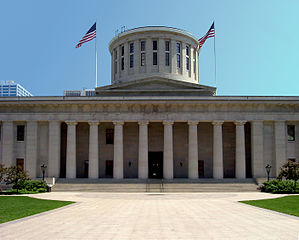
Ohio lawmakers plan to introduce legislation next month making significant changes to state ethics rules for the first time in decades. The bill would double the amount lobbyists can spend on gifts to lawmakers but require lobbyists and public officials to report when a lobbyist spends more than $100 per year on an official for meals, entertainment, transportation, or other gifts.
State Sen. Larry Obhof, a Republican co-sponsor of the bill, maintains a higher reporting threshold is necessary to keep lobbyists honest, as many lobbyists seek to find ways to avoid the lower threshold.
Other notable legislative provisions raise the lobbyist registration fee from $25 to $35, strengthen whistle-blower protection guidelines, allow lawmakers to remedy reporting errors, require random audits of financial disclosure statements, and make changes to procedures for ethics investigations. Bill sponsors argue the bill is intended to increase transparency and accountability.
Photo of the Ohio State Capitol courtesy of Alexander Smith on Wikimedia Commons.
Today the Phoenix, Arizona City Council is expected to vote on whether to create a city ethics commission and whether to add a gift policy to its ethics policies. According to the council’s agenda for the meeting, the proposed gift […]

Today the Phoenix, Arizona City Council is expected to vote on whether to create a city ethics commission and whether to add a gift policy to its ethics policies.
According to the council’s agenda for the meeting, the proposed gift policy identifies permissible and prohibited gifts for elected officials, employees, board members, and volunteers.
It also identifies permissible gifts to elected officials required to be disclosed on a form submitted to and posted by the city clerk.
According to AZCentral.com, the proposed ordinance would allow officials to avoid disclosing event tickets, food, drinks, transportation, or lodging they received as long as such gifts were related to economic development, tourism promotion, or a sister-cities program.
If passed, the ordinance would also create an ethics commission authorized to receive allegations of ethical violations, investigate, take testimony, and engage in any other activity in order to oversee the investigation and enforcement of the gift policy and other conflicts of interest.
The meeting is scheduled to start at 3:00 p.m.
April 2, 2014 •
Pennsylvania House Committee Bans Cash Gifts
The Pennsylvania House Bipartisan Management Committee has adopted an ethics rule banning cash gifts. The rule was imposed in response to the highly publicized sting operation involving four House members who allegedly took cash from a lobbyist. The rule permits […]

The Pennsylvania House Bipartisan Management Committee has adopted an ethics rule banning cash gifts.
The rule was imposed in response to the highly publicized sting operation involving four House members who allegedly took cash from a lobbyist.
The rule permits house members to receive cash from family members and non-lobbyist friends.
Photo of the Pennsylvania State Capitol courtesy of Michael180 on Wikimedia Commons.
March 21, 2014 •
Philadelphia Adopts Dollar Limit on Gifts
Philadelphia passed ethics legislation providing a dollar limit on gifts during its March 20 meeting. The legislation prohibits all city officers and employees from receiving gifts worth more than $99 in a calendar year from any donor, and bans all […]
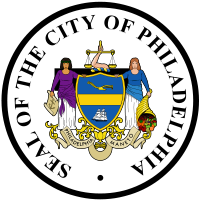
Philadelphia passed ethics legislation providing a dollar limit on gifts during its March 20 meeting. The legislation prohibits all city officers and employees from receiving gifts worth more than $99 in a calendar year from any donor, and bans all cash gifts.
A number of exceptions are provided, including food and beverage at meetings and non-ticketed receptions.
The bill is expected to be signed by Mayor Nutter. Board of Ethics Executive Director Shane Creamer said the Board will begin working on new gift regulations once the bill is signed.
February 25, 2014 •
Philadelphia Gift Ordinance Advances Out of Committee
A proposed ordinance setting a dollar limit for gifts has advanced out of committee. On February 24, the City Council’s Committee on Law and Government voted to submit the bill for Council action. The proposed ordinance prohibits gifts exceeding $99 […]

A proposed ordinance setting a dollar limit for gifts has advanced out of committee. On February 24, the City Council’s Committee on Law and Government voted to submit the bill for Council action.
The proposed ordinance prohibits gifts exceeding $99 per calendar year to any city officials or employees, and bans all cash gifts.
The ordinance could pass as early as next week.
October 28, 2013 •
Los Angeles, California Council Looks to Increase Gift Limits
Ethic Commission recommends the opposite
 City Council instructed the city’s lawyers to draft an ordinance increasing the gift limit to $150 for gifts provided by bidders, contractors, and other restricted sources. Currently, people doing business with the city can provide gifts to city officials valued at $100 or less per calendar year.
City Council instructed the city’s lawyers to draft an ordinance increasing the gift limit to $150 for gifts provided by bidders, contractors, and other restricted sources. Currently, people doing business with the city can provide gifts to city officials valued at $100 or less per calendar year.
Recently, the Los Angeles Ethics Commission recommended curtailing gifts to city officials, hoping to boost public confidence in government. The commission’s recommendation would have extended the current ban on gifts from lobbyists to all people with a financial stake in city decisions.
Photo of the Los Angeles City Hall by Brion Vibber on Wikipedia.
May 10, 2013 •
Ask the Experts – Providing Gifts to Public Officials
Here is your chance to “Ask the Experts” at State and Federal Communications, Inc.

Q. My company is involved in an event where a meal and other gifts may be provided to public officials. How do I know if this is permissible?
A. You must consider a number of issues any time you want to provide a gift to a public official. In addition to consulting your company’s policies, you should answer the following questions:
- Is it a gift? States often have exceptions to the definition of gift. Arizona does not consider an expenditure for food, beverage, travel, or lodging to be a gift under state law. A number of states do not consider things of value provided on the basis of a personal relationship or items of de minimis value to be gifts.
- Who is the giver? Lobbyists are often subject to more stringent gift restrictions than non-lobbyists. Florida prohibits any gifts from lobbyists to state officials and employees with very few exceptions. However, if you are not registered as a lobbyist, you are permitted to give any gift if it is not given to influence any official action. California imposes different gift limits; the limit is $10 or less per month for lobbyists and $440 or less per year for non-lobbyists. Additional restrictions could apply if your company is a state contractor. Connecticut does allow limited gifts from lobbyists and non-lobbyists. However, state contractors must certify no gifts were made under certain circumstances.
- Who is the recipient? The permissibility of a gift can depend on the branch of government or the seniority of the official or employee. Maryland legislators may only accept food and beverage from lobbyists in very limited circumstances. Executive branch officials may accept food and beverage if they are in the presence of the lobbyist. Delaware only restricts cabinet secretaries, division directors, and the governor’s professional staff from accepting gifts from lobbyists.
If you are anything less than 100% sure a gift is permissible, consult the state’s ethics agency. Do not ask the official or employee involved! He or she may not be familiar with the nuances of the state’s gift law.
You can directly submit questions for this feature, and we will select those most appropriate and answer them here. Send your questions to: marketing@stateandfed.com.
(We are always available to answer questions from clients that are specific to your needs, and we encourage you to continue to call or e-mail us with questions about your particular company or organization. As always, we will confidentially and directly provide answers or information you need.) Our replies to your questions are not legal advice. Instead, these replies represent our analysis of laws, rules, and regulations.
June 11, 2012 •
Chicago Mayor Introduces Ethics Reform Amendment
Gift ban, reverse revolving door, code of conduct, and regulating PACs
 Mayor Rahm Emanuel introduced an ethics reform amendment to the city council on June 8. The amendment, based on the recommendations given to him by the Ethics Reform Task Force, would strengthen the gift ban, add a reverse revolving door provision, and increase the penalties for PACs who accept illegal contributions. The amendment also includes a code of conduct for city officials and employees, which is something the city has never had before.
Mayor Rahm Emanuel introduced an ethics reform amendment to the city council on June 8. The amendment, based on the recommendations given to him by the Ethics Reform Task Force, would strengthen the gift ban, add a reverse revolving door provision, and increase the penalties for PACs who accept illegal contributions. The amendment also includes a code of conduct for city officials and employees, which is something the city has never had before.
The city council will now decide the fate of the mayor’s initiatives. The Ethics Reform Task Force will release its second set of recommendations in late July, this time focusing on the relationship between, and the key responsibilities of, the city’s ethics institutions.
Photo of Chicago skyline by mindfrieze on Wikipedia.
March 30, 2012 •
News You Can Use Digest – March 30, 2012
Here are highlights from the latest edition of News You Can Use:

Federal:
Democratic Rep. Bobby Rush Escorted from House Floor for Wearing Hoodie in Honor of Trayvon Martin
Payday Lender Political Donors Hidden in Corporate Names
From the States and Municipalities:
Arizona
After Bowl Scandal, Many Arizona Legislators Still Want Tickets to Baseball Opener
California
Medco Settles California Pension Fund Kickback Case
Delaware
Lobbying Disclosure Bill Shines Critical Sunlight on Lawmaking Process
District of Columbia
D.C. Ethics Law Overhaul Hampered by Hiring Difficulties, Enforcement Duties
Georgia
‘Revolving-Door’ Powers Politics
Hawaii
Judge Confirms Hawaii Can’t Limit Independent Expenditures
Illinois
Employee Gift Ban Recommendation Still Has Few Takers
Iowa
New Mexico
New York
Lobbyists Reaping $220 Million Bonanza
Utah
How Utah’s Capitol Marches to a Mormon Beat

News You Can Use is a news service provided at no charge only to clients of our online Executive Source Guides, or ALERTS™ consulting clients.
State and Federal Communications, Inc. provides research and consulting services for government relations professionals on lobbying laws, procurement lobbying laws, political contribution laws in the United States and Canada. Learn more by visiting stateandfed.com.


